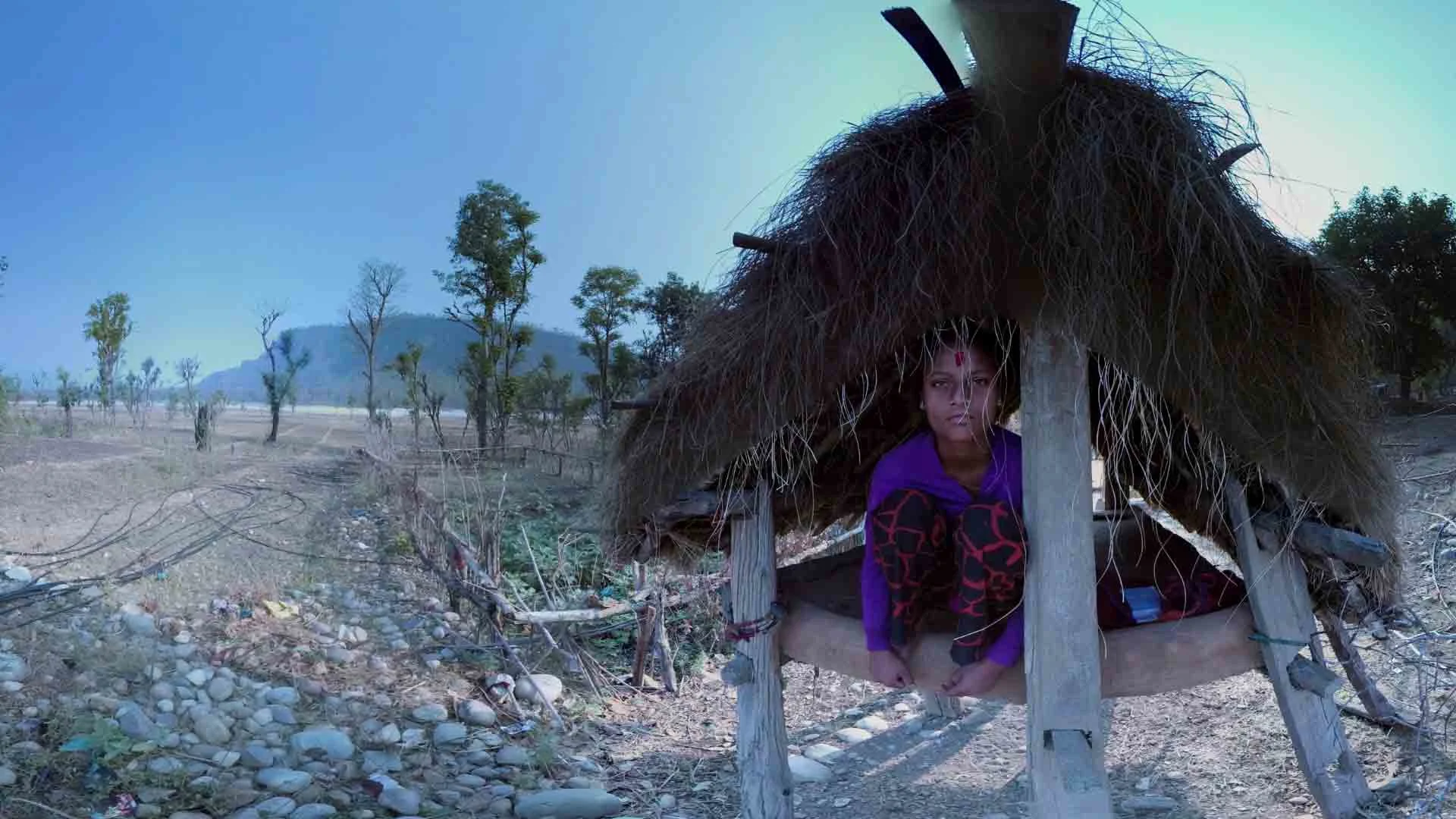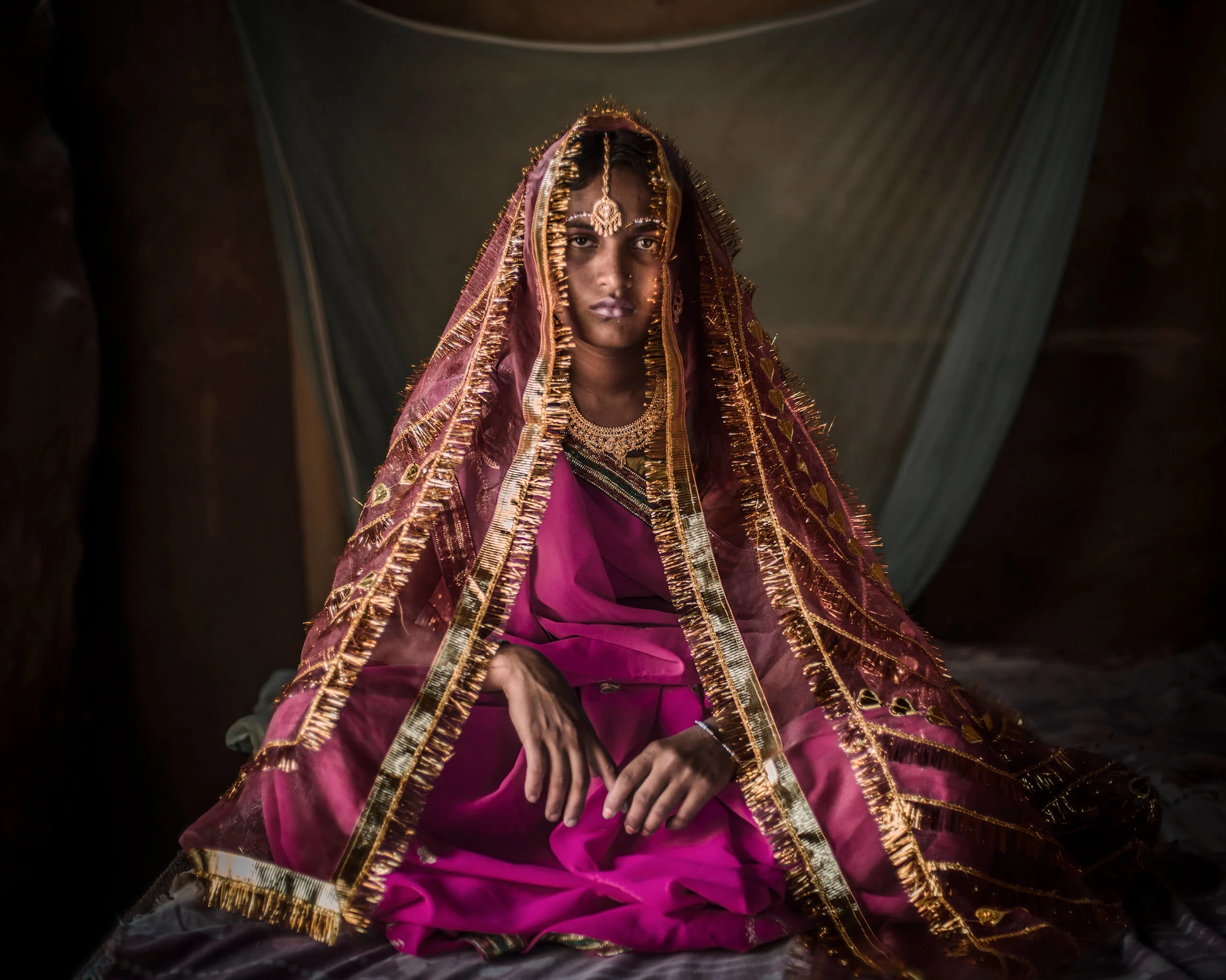

In 2013 Indian photographer and activist Poulomi Basu was doing research into normalized violence against women when she chanced upon chaupadi. It’s an extreme practice in western Nepal where Hindu women and girls are banished from their homes and isolated from their families during their monthly menstruation.
As the women are seen as “impure” during this time, they’re forced to stay for several days in small outdoor sheds, often a far and difficult walk away from their homes. Women who bleed after childbirth are treated the same; they’re sent to the huts with their newborn babies for 15 days.
“I had never encountered anything so vile that treats women worse than animals and is so endemic and layered,” Poulomi says. “I had to do something about it!” With the help of Water Aid UK, and with funding from the Magnum Foundation Fund grant, she set out to document chaupadi through her transmedia project Blood Speaks: A Ritual of Exile.

This is a deeply nuanced project which could never be adequately investigated in just a series of pictures.
Trekking through remote areas of western Nepal, Poulomi went from village to village to find women who were subjected to the ritual and were happy to talk about it. She worked with local community workers who told her of specific households where it was practiced.
She discovered that, alone in the wilderness, many women die from snake bites or asphyxiation from the smoke of the fires they build to keep warm in freezing temperatures. Isolated and unprotected, women are raped and in more extreme cases abducted and murdered.
“Those that survive their repeated exiles must spend a lifetime battling with the devastating consequences of PTSD,” Poulomi says.
Poulomi grew up in a patriarchal Hindu household in India, so she is familiar with the use of ritual and tradition as a mechanism to control women. Once she began menstruating she wasn’t allowed to enter the kitchen during her period nor could she participate in any festivities.
“As a result, my commitment to this subject runs deep,” she says. “It was only by leaving home that I could be free from any patriarchal control and irrational practices and traditions. This is not an option for many women growing up in similar circumstances.
“It’s important to rationalize the structures that create these circumstances so that we may look beyond traditions and practices to understand what they represent and what injustices are carried out under their guise.”

They are not static, frozen moments but alive with possibility and presence.
Once Poulomi found her potential subjects she worked on gaining their trust. “I usually tell them directly what I am there for,” she says. “Not only to observe the ritual but also as a woman I am aware of their difficulties during this time of social ostracisation.”
She shared stories and secrets of her own life to find common ground and gradually the women opened up. Only then would she take out her camera and photograph them.
The gripping photographs of the women have traveled the world educating new audiences about the harsh realities of this practice. This year alone, Poulomi has shown Blood Speaks at the Cortona on the Move Festival in Italy, at the Margaret Mead Film Festival at The American Museum of Natural History in New York and it was shortlisted for the Sheffield Doc Fest’s Alternate Realities award.
Significantly, she’s also been invited to take the work back to Nepal and it’s going to be translated into Mandarin to be shown across China. “Whilst the work has had tremendous coverage in the West and has helped to raise awareness of this issue, it is fantastic to me to see the work distributed across Asia,” she says.
“There is a commonality of experience - in terms of societies and structures - that allows the endemic, deep-rooted and subtle form of patriarchal control to be perceived much more clearly.”
Poulomi wanted to take the project further, so she made video portraits through which the presence of the women is felt even more greatly.
“This is a deeply nuanced project which could never be adequately investigated in just a series of pictures,” she says. The video portraits are a way of creating a stronger emotional connection between the women and the viewer. “They are not static, frozen moments but alive with possibility and presence. We are not looking “at” but spending time “with” - this is an important distinction for me.”

Those that survive their repeated exiles must spend a lifetime battling with the devastating consequences of PTSD.
Even more intimate is the virtual reality experience she adds on. Often seen as isolating and claustrophobic, VR was the perfect medium to accurately mirror the experience of the women and girls enduring chaupadi.
“I believe the medium and the message should be completely aligned and the choice of technology - be it photography, VR or whatever - is crucial in terms of making a significant impact to reach existing audiences and forge and engage with new audiences throughout the world,” Poulomi says.
“VR helps to create a commonality of experience - helping me to bring home the idea of how women are silenced and made subservient all around the world using religion, traditions and customs. Through the prism of one culture we may see another more clearly.”
Poulomi’s VR experiences follow the story of three women. One focuses on Tula who, barred from household chores during her period, spends this time working as a porter to contribute to the family’s income.
She carries everything from firewood to heavy satellite dishes long distances across rugged terrain so richer families can watch TV. A trip can take her three days and she makes the equivalent of 20 US cents for her efforts. She does this all while studying for her school exams.
A second story focuses on Lakshmi, a mother of three young children abandoned by her husband who is forced into exile by her mother-in-law. Her five-year-old son Roshan is too young to be without his mother and endures the exile alongside her.
“Despite all the obstacles, Lakshmi’s instinct to protect and provide for her children is undefeated,” Poulomi says. “This story is a testament to her resilience in the face of such violence and stigma.”

I carry the stories of the women with me, and I feel tremendous responsibility to ensure their voices are heard.
The third story features 16-year-old Saraswati suffering from a severe stress disorder. She gave birth just days before Poulomi met her.
Inevitably the question of objectivity comes up when talking about photojournalism, and it’s clear that Poulomi tries to bring across a message to her audience. She insists Blood Speaks is not photojournalistic, instead she coins her approach transmedia activism.
“This is a social justice project and, as such, objectivity is a myth,” she says. “You choose your side and my reasons for documenting such practices and my desire to see an end to such gender-based violence and tradition as a form of control is clear. Journalism for me is a mere set of research tools but I see no purpose in being objective when documenting such abuse.”

Becoming emotionally involved in a story and witnessing human rights violations like chaupadi can take its toll on your own mental health, especially when returning to regular life.
“It is difficult to completely protect yourself,” Poulomi says. “I carry the stories of the women with me, and I feel tremendous responsibility to ensure their voices are heard. As to how I protect myself, I practice Transcendental Meditation twice daily and I have three dogs!”
Poulomi’s efforts have played a role in putting pressure on the Nepalese government who finally criminalised chaupadi in 2017. Though a huge positive step, in some communities the ruling has driven the practice underground.
“Whilst we need a political movement we also need a social movement to change hearts and minds,” Poulomi says. “I believe this work is more important now than ever.”
Words by Alix-Rose Cowie.

